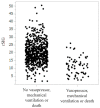The reverse shock index multiplied by the Glasgow Coma Scale score can predict the need for initial resuscitation in patients suspected of sepsis
- PMID: 37655188
- PMCID: PMC10461333
- DOI: 10.35772/ghm.2023.01008
The reverse shock index multiplied by the Glasgow Coma Scale score can predict the need for initial resuscitation in patients suspected of sepsis
Abstract
For patients suspected of sepsis, early recognition of the need for initial resuscitation is key in management. This study evaluated the ability of a modified shock index - the reverse shock index multiplied by the Glasgow Coma Scale score (rSIG) - to predict the need for initial resuscitation in patients with sepsis. This retrospective study involved adults with infection who were admitted to a Japanese tertiary care hospital from an emergency department between January and November 2020. The rSIG, modified Early Warning Score (MEWS), quick Sequential Organ Failure Assessment (qSOFA), and original shock index (SI) values were recorded using initial vital signs. The primary outcome was the area under the receiver-operating characteristic curve (AUROC) for the composite outcome consisting of vasopressor use, mechanical ventilation, and 72-h mortality. Secondary outcomes were the AUROCs for each component of the primary outcome and 28-day mortality. As a result, the primary outcome was met by 67 of the 724 patients (9%). The AUROC was significantly higher for the rSIG than for the other tools (rSIG 0.84 [0.78 - 0.88]; MEWS 0.78 [0.71 - 0.84]; qSOFA 0.72 [0.65 - 0.79]; SI 0.80 [0.74 - 0.85]). Compared with MEWS and qSOFA, the rSIG also had a higher AUROC for vasopressor use and mechanical ventilation, but not for 72-h mortality or in-hospital mortality. The rSIG could be a simple and reliable predictor of the need for initial resuscitation in patients suspected of sepsis.
Keywords: early warning score; emergency department; resuscitation; sepsis; shock index; triage.
2023, National Center for Global Health and Medicine.
Conflict of interest statement
The authors have no conflicts of interest to disclose.
Figures



Similar articles
-
Reverse shock index multiplied by Glasgow Coma Scale score (rSIG) is a simple measure with high discriminant ability for mortality risk in trauma patients: an analysis of the Japan Trauma Data Bank.Crit Care. 2018 Apr 11;22(1):87. doi: 10.1186/s13054-018-2014-0. Crit Care. 2018. PMID: 29642920 Free PMC article.
-
Reverse Shock Index multiplied by Glasgow Coma Scale score as a point-of-care severity assessment for initial trauma management: A nationwide cohort study.Injury. 2024 May;55(5):111267. doi: 10.1016/j.injury.2023.111267. Epub 2023 Dec 13. Injury. 2024. PMID: 38129233
-
The Reverse Shock Index Multiplied by Glasgow Coma Scale Score (rSIG) and Prediction of Mortality Outcome in Adult Trauma Patients: A Cross-Sectional Analysis Based on Registered Trauma Data.Int J Environ Res Public Health. 2018 Oct 24;15(11):2346. doi: 10.3390/ijerph15112346. Int J Environ Res Public Health. 2018. PMID: 30355971 Free PMC article.
-
Reverse shock index multiplied by Glasgow coma scale as a predictor of massive transfusion in trauma.Am J Emerg Med. 2021 Aug;46:404-409. doi: 10.1016/j.ajem.2020.10.027. Epub 2020 Oct 20. Am J Emerg Med. 2021. PMID: 33143960
-
Comparison of qSOFA and Hospital Early Warning Scores for prognosis in suspected sepsis in emergency department patients: a systematic review.Emerg Med J. 2022 Apr;39(4):284-294. doi: 10.1136/emermed-2020-210416. Epub 2021 Aug 17. Emerg Med J. 2022. PMID: 34404680
Cited by
-
Reverse shock index multiplied by simplified motor score as a predictor of clinical outcomes for patients with COVID-19.BMC Emerg Med. 2024 Feb 14;24(1):26. doi: 10.1186/s12873-024-00948-5. BMC Emerg Med. 2024. PMID: 38355419 Free PMC article.
References
-
- Churpek MM, Snyder A, Han X, Sokol S, Pettit N, Howell MD, Edelson DP. Quick sepsis-related organ failure assessment, systemic inflammatory response syndrome, and early warning scores for detecting clinical deterioration in infected patients outside the intensive care unit. Am J Respir Crit Care Med. 2017; 195:906-911. - PMC - PubMed
-
- Usul E, Korkut S, Kayipmaz AE, Halici A, Kavalci C. The role of the quick sequential organ failure assessment score (qSOFA) and modified early warning score (MEWS) in the pre-hospitalization prediction of sepsis prognosis. Am J Emerg Med. 2021; 41:158-162. - PubMed
-
- Sabir L, Ramlakhan S, Goodacre S. Comparison of qSOFA and Hospital Early Warning Scores for prognosis in suspected sepsis in emergency department patients: A systematic review. Emerg Med J. 2022; 39:284-294. - PubMed
LinkOut - more resources
Full Text Sources
Research Materials
Miscellaneous

